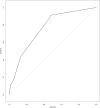Development and validation of a new tool to estimate early mortality in patients with advanced cancer treated with immunotherapy
- PMID: 39358642
- PMCID: PMC11447166
- DOI: 10.1007/s00262-024-03836-w
Development and validation of a new tool to estimate early mortality in patients with advanced cancer treated with immunotherapy
Abstract
Background: Immune checkpoint inhibitors (ICIs) are standard treatments for advanced solid cancers. Resistance to ICIs, both primary and secondary, poses challenges, with early mortality (EM) within 30-90 days indicating a lack of benefit. Prognostic factors for EM, including the lung immune prognostic index (LIPI), remain underexplored.
Methods: We performed a retrospective, observational study including patients affected by advanced solid tumors, treated with ICI as single agent or combined with other agents. Logistic regression models identified factors associated with EM and 90-day progression risks. A nomogram for predicting 90-day mortality was built and validated within an external cohort.
Results: In total, 637 patients received ICIs (single agent or in combination with other drugs) for advanced solid tumors. Most patients were male (61.9%), with NSCLC as the prevalent tumor (61.8%). Within the cohort, 21.3% died within 90 days, 8.4% died within 30 days, and 34.5% experienced early progression. Factors independently associated with 90-day mortality included ECOG PS 2 and a high/intermediate LIPI score. For 30-day mortality, lung metastasis and a high/intermediate LIPI score were independent risk factors. Regarding early progression, high/intermediate LIPI score was independently associated. A predictive nomogram for 90-day mortality combining LIPI and ECOG PS achieved an AUC of 0.76 (95% CI 0.71-0.81). The discrimination ability of the nomogram was confirmed in the external validation cohort (n = 255) (AUC 0.72, 95% CI 0.64-0.80).
Conclusion: LIPI and ECOG PS independently were able to estimate 90-day mortality, with LIPI also demonstrating prognostic validity for 30-day mortality and early progression.
Keywords: Early mortality; Immunotherapy; Prognostic prediction; Solid tumors.
© 2024. The Author(s).
Conflict of interest statement
The authors declare no competing interests. ADF has received honoraria from Society for Immunotherapy of Cancer and Advisory role from Hansen-Wade. FM has received research support and/or honoraria from Astellas, BMS, Janssen, Ipsen, MSD and Pfizer outside the submitted work. AA has received Honoraria for the participation to advisory boards and/or for lectures from BMS, Eli-Lilly, MSD, AZ, Roche, Takeda, Janssen, Sanofi, Novartis, AbbVie, Daiichi. AL has received speakers’ fee for Astra-Zeneca, MSD, Takeda and Sanofi. AL has been on advisory board for BeiGene, Sanofi, Novartis, Astra-Zeneca. AL has attended editorial activities sponsored by Roche and Eli Lilly. AL has received travel support from MSD and Novartis. MT received speakers’ and consultants’ fee from Astra-Zeneca, Pfizer, Eli-Lilly, BMS, Novartis, Roche, MSD, Boehringer Ingelheim, Otsuka, Takeda, Pierre Fabre, Amgen, Merck, Sanofi. MT received institutional research grants from Astra-Zeneca, Boehringer Ingelheim.
Figures
References
-
- Ferrara R, Mezquita L, Texier M et al (2020) Comparison of fast-progression, hyperprogressive disease, and early deaths in advanced non-small-cell lung cancer treated with PD-1/PD-L1 inhibitors or chemotherapy. JCO Precis Oncol 4:829–840. 10.1200/PO.20.00021 - PubMed
-
- Mulkey F, By K, Theoret MR et al (2019) Analysis of early mortality in randomized clinical trials evaluating anti-PD-1/PD-L1 antibodies: a systematic analysis by the United States Food and Drug Administration (FDA). J Clin Oncol 37:2516
Publication types
MeSH terms
Substances
Grants and funding
LinkOut - more resources
Full Text Sources
Medical



